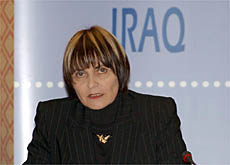Calmy-Rey warns of devastating impact of war

The Swiss foreign minister, Micheline Calmy-Rey, has officially opened a conference to discuss the likely humanitarian cost of a war in Iraq.
In her opening speech, Calmy-Rey told conference participants that a conflict could have “devastating consequences” for the country’s civilian population.
“We are here because it is time to talk openly and publicly about humanitarian assistance and respect for international humanitarian law,” she said
The two-day meeting, which is taking place in Geneva, was organised on the initiative of Calmy-Rey and the Swiss Agency for Development and Cooperation (SDC).
Twenty-one aid agencies, including the International Committee of the Red Cross and the United Nations Refugee Agency, are taking part. All but one of the 30 countries invited have sent representatives too.
The United States is the only country that refused to attend, on grounds that UN agencies have already made extensive preparations and it is unclear how the meeting would help.
Iraq was not invited to the conference, in order, Swiss officials said, to avoid politicising the event.
War damage
Both Calmy-Rey and SDC officials have stressed that the meeting is purely humanitarian in character, focusing on the logistics of providing aid to Iraq in the event of war.
“Switzerland wants to provide the humanitarian players with a platform for discussion – a platform for the sharing of information,” said Calmy-Rey, adding that she still believed war could be averted.
SDC spokesman Joachim Ahrens explained that for this reason the essence of the meeting would be highly practical.
“The agenda includes practical issues of humanitarian aid,” Ahrens told swissinfo. “For example, contingency planning, trying to anticipate the movements of refugees, and so on.”
United Nations aid agencies have in fact been preparing their response to war in Iraq for some time now, and it is unlikely that the meeting in Geneva will cause any major changes of plan.
But the fact that Ruud Lubbers, the head of the UN Refugee Agency, and Jakob Kellenberger, the head of the ICRC, are attending, is a sign that humanitarian organisations feel the meeting could be beneficial.
Economic sanctions
Aid agencies are particularly concerned that the 12 years of economic sanctions against Iraq have left it in a situation which leaves it poorly prepared to withstand any form of conflict.
Foreign aid workers in the country report widespread malnutrition among Iraqi children, while hospitals are said to suffer extreme shortages of medicines and equipment.
“The situation in Iraq is difficult,” said Calmy-Rey. “The sanitary infrastructures and drinking water supplies are already insufficient. The resistance of the Iraqi people is very low and the risk of a massive humanitarian crisis commensurately high.
The United Nations has already appealed for over $100 million to prepare food and other humanitarian supplies for Iraq. UN planners fear a refugee crisis involving millions of people, should war break out.
Conflict situation
Calmy-Rey urged conference participants to use the next two days in Geneva to strengthen their coordination networks and to take stock of the resources necessary to bring aid in a conflict situation.
She also suggested that, depending on the circumstances, a follow-up meeting might be useful.
“I am convinced that everything possible must be done and that we will do it together,” she said.
“Faced by the women, the children, the elderly, faced by all who could be affected, injured, killed or made refugees, inaction and indifference cannot be permitted.”
swissinfo, Imogen Foulkes
29 countries and 21 aid organisations have agreed to attend the meeting.
Iraq was not invited, and the United States has said it will not participate.
The two day meeting will be led by the Swiss Agency for Cooperation and Development
Switzerland has provided almost SFr5 million worth of aid a year to Iraq since the 1991 Gulf War.
An overwhelming majority of Swiss are against war against Iraq, according to a poll carried out by the Swiss Broadcasting Corporation.
Nearly 88 per cent of those polled said they were against war.
Just 5.4 per cent of the 930 respondents said they supported military action, while 6.6 per cent had no opinion.
The poll showed that even with UN Security Council backing, nearly three out of four Swiss would still be against war in Iraq, versus almost 18 per cent who would support it.
Over 60 per cent of those polled also said Switzerland should play a more active role in helping to resolve any conflict.

In compliance with the JTI standards
More: SWI swissinfo.ch certified by the Journalism Trust Initiative









You can find an overview of ongoing debates with our journalists here . Please join us!
If you want to start a conversation about a topic raised in this article or want to report factual errors, email us at english@swissinfo.ch.